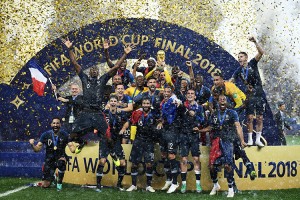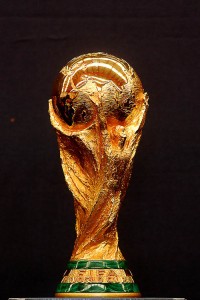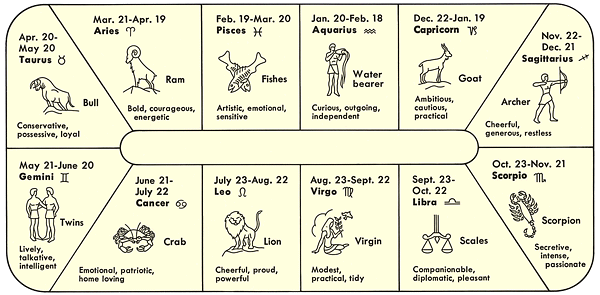France Atop the Soccer World
Tuesday, July 17th, 2018July 17, 2018
On Sunday, July 15, at Luzhniki Stadium in Moscow, Russia, the French national men’s soccer team defeated Croatia 4-2 to win the FIFA World Cup championship. It was the second world title for France, which first won the tournament in 1998. It was Croatia’s first trip to the World Cup final. FIFA stands for Fédération Internationale de Football Association (International Federation of Association Football). Soccer is called football or association football in much of the world. FIFA is soccer’s world governing body. Held every four years, the World Cup is the world’s most important and prestigious soccer tournament.

The French national men’s soccer team celebrates its World Cup championship at Luzhniki Stadium in Moscow, Russia, on July 15, 2018. Credit: © Franck Fife, AFP/Getty Images
Winning the global soccer championship is the dream of every nation’s team, and fans on every continent—yes, Antarctica too—follow the tournament closely, even rabidly, devouring every minute of every match. Many fans travel great distances and pay exorbitant amounts of money to watch their teams compete in the tournament, which was played this year in 12 stadiums in mostly western Russian cities. The World Cup is the end of a two-year elimination tournament process that narrows the global field of more than 200 teams to just 32. The host country (in this case, Russia) and the previous champion (Germany) receive automatic berths.

The year and name of each FIFA World Cup winner since 1974 is engraved on the underside of the trophy. Credit: © Alfredo Lopez, Jam Media/LatinContent/Getty Images
The opening group stage of the World Cup divides the 32 teams into 8 groups of 4. The top two teams of each group advance after playing the other three teams in their group. This year, Russia romped its way through the opening stage in front of delirious fans. Germany, however, became the fourth defending champion in the last five tournaments to be eliminated in the group phase. Superstar forward Cristiano Ronaldo of Portugal shone in the opening round, while fellow star Lionel Messi helped prevent early ejection for Argentina.
In the so-called “knockout” phase (because one loss means elimination) of 16 teams, both Ronaldo and Messi packed their bags for home, as did the Mexico team that looked so impressive in the group stage. A talented Belgium squad mounted a furious comeback to eliminate Japan, which was the first World Cup team to advance from the group stage on “fair play” points. Japan had tied Senegal in every category on the field but one: the Japanese had fewer fouls. In the intense quarterfinals, Belgium, England, and France advanced over Brazil, Sweden, and Uruguay, respectively, and feisty Croatia scraped by in a penalty kick shootout win over Russia. In the semifinals, France downed Belgium 1-0, and England lost to Croatia and its superior midfield, 2-1.
From the opening kick of the World Cup final, France’s superb athletes dominated the pitch, outrunning and eventually out-shooting their Croatian opponents. A French free kick in the 18th minute (each match has two 45-minute halves) ricocheted off a Croatian defender and into the net, giving France a 1-0 lead on the first “own goal” in World Cup final history. The lead was short-lived, however, as Croatia’s Ivan Perišić knocked in the equalizer 10 minutes later. Before the half, French star Antoine Griezmann drilled a penalty kick for a 2-1 advantage.
France hit the accelerator in the second half as stars Paul Pogba and Kylian Mbappé each hit dazzling goals for a seemingly insurmountable 4-1 lead. As the champagne was chilling, however, a few ice cubes clinked to the floor as Mario Mandžukić retaliated with a Croatian goal in the 69th minute. The final 20 minutes then evaporated as France played keep away and thwarted every Croatian attack. A few minutes of stoppage time passed uneventfully, and the final whistle gave all of France—the team, the fans, and the nation—the feu vert (green light) to pop the corks.
French manager Didier Deschamps, who was team captain on the 1998 world championship squad, embraced his players as they lined up in a sudden drenching rain to receive their World Cup gold medals. For France, the date of its 2018 title (July 15) can now be celebrated every year after the country’s great national holiday, Bastille Day (July 14.) Croatian disappointment was quickly replaced by pride in the achievement of reaching the final, and midfielder Luka Modrić added to Croatia’s consolation by winning the Golden Ball Award as the tournament’s best player.
On the day before the World Cup final, Belgium defeated England 2-0 in the highly anticlimactic contest for third place in the tournament. England’s Harry Kane won the Golden Boot by leading all scorers with six goals. Thibaut Courtois of Belgium won the Golden Glove Award as the tournament’s best goalkeeper. Since the World Cup began in 1930, Brazil has the most championships (5); followed by Germany and Italy (4 each); Argentina, France, and Uruguay (2); and England and Spain (1).



